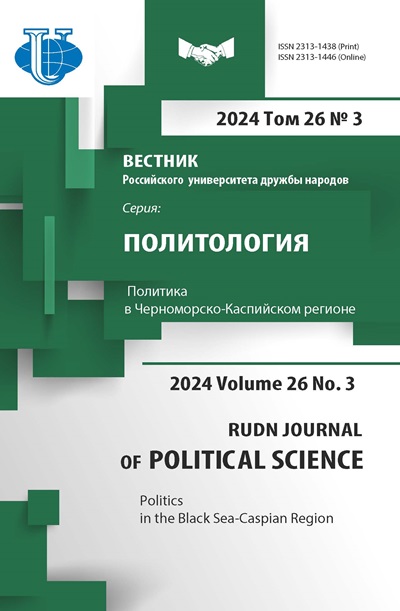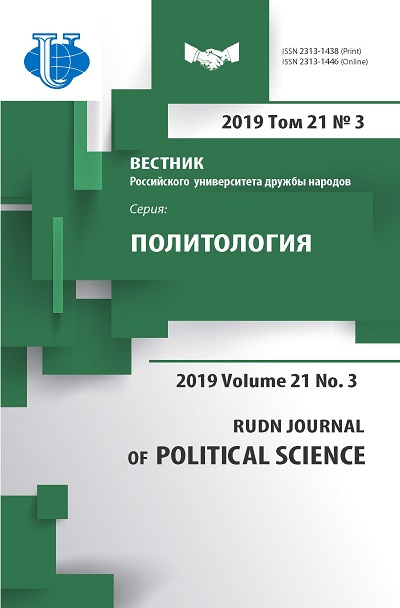“Our Home - Russia” as the Movement of Bright Centrism (1995-1999)
- Authors: Stepanov A.A1
-
Affiliations:
- Lomonosov Moscow State University
- Issue: Vol 21, No 3 (2019)
- Pages: 409-420
- Section: Political process in contemporary Russia: Prospects and trends
- URL: https://journals.rudn.ru/political-science/article/view/22053
- DOI: https://doi.org/10.22363/2313-1438-2019-21-3-409-420
Cite item
Full Text
Abstract
The article deals with the political movement “Our Home - Russia” (NDR) as the first attempt of the creation of the “party of power” in post-soviet period. The aim of this work is to analyze the experience of the NDR and the reasons of the failure of this project. In the course of the study, the historical genetic method, M. Duverger’s partological analysis, and A. Gramsci’s theory were used. The author turned to the political science literature on parties and elections in the Russian Federation and used NDR’s materials and publications of federal mass media as primary sources. In 1995 the movement was created with the experience and the basis of the preceding pro-Kremlin project the “Democratic Choice of Russia” (DVR). Unlike the DVR, it was built on the B. Eltsin’s initiative who needed the support in the State Duma all the time. The prime minister V. Chernomyrdin headed this union and members of political and financial elite of federal and regional levels became its leaders. Despite their strength the movement did not become full-fledged «party of power» because of the communists` domination in the Duma and the lack of large electoral support. The «Our Home - Russia» like DVR could not make effective regional divisions and spread its influence among people masses. The inner split, weakness of Chernomyrdin’s figure and the absence of due president’s support were the causes of its fail in the parlamentary elections of 1999. Nevertheless, the NDR became the first centrist movement in post-Soviet Russia, which retained loyalty to the Kremlin to the end. The union worked out new forms, for example, drew public organizations to its side and for the first time used «name tactics» in the 1995 elections. These developments were useful in the creation of the next, much more successful pro-regional project - the «United Russia».
About the authors
Artemiy A Stepanov
Lomonosov Moscow State University
Author for correspondence.
Email: stepanovartemij135@gmail.com
Post-graduate Student of the Chair of History of Social Movements and Political Parties
Moscow, Russian FederationReferences
- Popov A.M. Elections 1993 and 1995 to the State Duma of the Russian Federation: Some Aspects of Political Party Struggle. Vologda; 1999. 100 p. (In Russ.).
- Volgin E.I. Social-political Associations at the Turn of the Century. Part I: The Second Half of 1980—1999 г. Course of lectures. Moscow; 2012. 106 p. (In Russ.).
- The Big Contemporary Encyclopedia of Politics. Ed. by Beljakov A., Matveychev O. Moscow: EKSMO; 2009. 412 p. (In Russ.).
- Duverger M. Political Parties. Translated from French. Moscow: Academic avenue; 2002. 560 p. (In Russ.).
- Shakirov Y. Party of Power 1993—2000: (Historical Background of All-Russia Political Party “United Russia”). Novomoskovsk; 2009. 239 p. (In Russ.).
- The Programme of All-Russia Social-political Movement “Our Home — Russia”. Мoscow; 1995 (In Russ.).
- Delyagin M. The Programme of NDR is the Choice of Economic Strategy. Кommersant — Vlast’. 22.08.1995; 30. Available from: https://www.kommersant.ru/doc/11409. Accessed: 15.05.2019. (In Russ.).
- Shljapuznikov A., Elkin A. There Are such Parties! The Electorate’s Guidebook. Moscow; 2007. Available from: http://www.scilla.ru/works/partii07/er.html. Accessed: 14.10.2016. (In Russ.).
- Nezavisimaya gazeta. 28.12.1995; 29. (In Russ.).
- Election Results to State Duma of the Federal Assembly of the Russian Federation at 17 December 1995. Handbook “The Second State Duma of the Federal Assembly of the Russian Federation”. Available from: http://www.panorama.ru/fs/gd2rezv.shtml. Accessed: 21.04. 2019. (In Russ.).
- Kinev A., Lubarev A. Parties and Elections in Modern Russia: Development and Devolution. Moscow: New lit. review; 2011. 786 p. (In Russ.).
- Baturin Y., Iljin A., Kadazkij V., Kostikov V., Krasnov M. The Epoch of B. Yeltsin: Outline of Political History. Moscow: WAGRIUS; 2001. 815 p. (In Russ.).
- No Anticommunist Majority in the Duma. Kommersant. 17.07.1996; 120. Available from: https://www.kommersant.ru/doc/236481. Accessed: 15.05.2019. (In Russ.).
- Gramsci A. Selected Works. In 3 Volumes. Vol. 2: The Prison Notebooks. Translated from Italian. Moscow; 1959. 565 p. (In Russ.).
- Beljaev S. Chernomyrdin Can Keep NDR on the Float. Кommersant. 25.03.1998; 51. Available from: https://www.kommersant.ru/doc/195122. Accessed: 15.05.2019. (In Russ.).
- Until All Are at Homes. Кommersant — Vlast’. 31.03.1998; 11. Available from: https://www.kommersant.ru/doc/14254. Accessed: 15.05.2019. (In Russ.).
- NDR Steps into the 21st Century. Weekly Journal “Аrguments and Facts”. 01.09.1999; 35. Available from: http://www.aif.ru/archive/1634438. Accessed: 01.04.2019. (In Russ.).
















